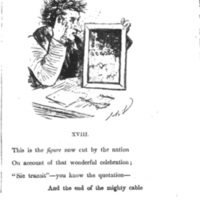The Lay of the Cable
Title
The Lay of the Cable
Description
I chose to analyze an illustration in a series of pictures paired with a poem. This poem had a span of two pages and was titled “The Lay of the Cable”(Campbell 744). The poem talks about the “inlays and outlays; the relays and delays”(Campbell 744) of the Atlantic Cable. I found this particularly interesting because the author took a current problem and turned it into a comedic poem. This topic was also talked about in earlier portions of the magazine in a more factual manner. The Transatlantic Cable was proved successful in August of 1858 after many attempts, finally creating a way of communication between the US and Britain. The first message successfully sent was ‘Glory to God in the highest, on earth peace, goodwill to men.’ (The Institute) This technological advance was of great importance to those in the US, so it was a disappointment when high voltage levels lead to its demise. Each illustration is an object pertaining to the reaction and celebration of this cable before its failure. The last image, the one in which I decided to further analyze, is one representing the end of the “mighty cable”(Campbell 745). The illustration is paired with the lines “This is the figure now cut by the nation. On account of that wonderful celebration; “Sic transit”-you know the quotation- and the end of the mighty cable”(Campbell 745). The illustration presents a man with a distressed and stupefied facial expression. The man’s appearance portrays the overwhelming emotion of defeat and failure, something shared among those who had hope in such an accomplishment. In the first stanza of the poem underneath the photo, the word “figure” is italicized. This term is being used to emphasize what a role this cable took in society. The cable or figure is a symbol of success, which is said to be cut by the nation. The cutting of this figure suggests failure and loss of hope. “Sic transit”, the quotation in which the reader is expected to know, translates as "Thus passes the glory of the world." in Latin. The feeling of accomplishment once the cable successfully connected two continents (the glory of the world) has passed once it reached its demise. This quotation also relates to the first message sent through the cable, being that they both use the word “glory” and have religious basis. The two quotes seem to contrast each other. I believe the use of the word “mighty” when describing the cable is sarcasm since the cable proved to be quite the opposite. This use of irony and sarcasm is similar to that of Henry George in “Washington Square”. This two-page spread shows that they made light of a rather disappointing situation. The author took a rather factual current event and made it in to a comical literary piece. This suggests that literature in every aspect of life played a major role in New York during the 1850’s.
Source
Harper's Weekly [COMPLETE CITATION NEEDED]
Date
November 20th, 1858
Files
Collection
Citation
“The Lay of the Cable ,” Three Decades of NYC, accessed January 29, 2026, http://www.loyolanotredamelib.org/en203/items/show/23.

